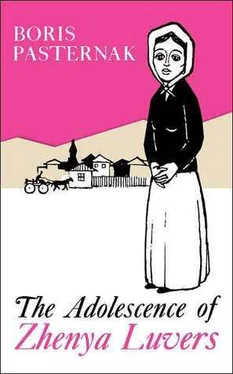What she saw could not be described. The swaying forest of hazelnut trees, through which the train was winding, became a sea, the world, anything one wished it to be. The sunlit, murmuring forest ran down sloping hills, the trees becoming smaller, denser and gloomier, until it fell away steeply into a black emptiness. And what hung on the other side of the chasm was like a greenish-yellow storm cloud, twisted and convoluted, but frozen, turned to stone. Zhenya held her breath and suddenly felt the speed of this limitless, unself-conscious air, and saw that the storm cloud was a great mass of earth, that it had the name of a famous mountain, which rolled down like thunder and was hurled with sand and rocks into the valley, that the hazelnut forest knew the name and whispered it ceaselessly, here, there, everywhere.
“Is this the Urals?” she asked the whole compartment and leaned out of the berth.
She spent the rest of the journey glued to the window in the corridor, leaning out. She was greedy for this new experience. She discovered that it was much more beautiful to look backward than forward. Majestic acquaintances wrapped themselves in mist and disappeared in the distance. After a brief separation, while over the rhythmic clatter and rattle of the couplings a cold draft hit the back of your neck and a new marvel emerged right before your nose, you discovered them again. The mountain panorama stretched itself out and grew ever larger. Some mountains became darker, others were suddenly sunlit; some were obscured, others dis appeared into darkness. They met and separated, they fell and rose. All this moved slowly in a circle, like the stars, with the cautious gyrations of giants, missing disaster by a hair’s breadth, ever worried about the preservation of the earth. These complicated motions were accompanied by a steady and powerful echo that was inaudible to human ears, but which was aware of everything. It watched them with eagle eyes, dark and dumb. It held a grand parade. Thus are the Urals built, built and rebuilt.
She returned for a moment to the compartment and shut her eyes to the dazzling light. Her mother was talking and laughing with the fat man. Seryozha was sliding back and forth on the red plush seat, holding on to a leather strap fastened to, the wall. Her mother spat out the last fruit pulp into her hand, swept away the pips that had fallen on her dress, leaned over lithely and tossed the debris under the seat. The fat man, contrary to all expectation, had a hoarse, cracked voice. He obviously suffered from asthma. Her mother introduced Zhenya to him, and he gave her a tangerine. He was comical and probably good-natured. Time and again he raised his pudgy hand to his mouth when he spoke. His voice rose, suddenly sounded strained and was abruptly cut off. It turned out that he lived in Yekaterinburg, had traveled all over the Urals and knew them very well. When he took his gold watch out of his waistcoat pocket, held it close to his nose and put it back, Zhenya saw that he had good-natured fingers. Like all fat men he did things with an air, as though he were giving them away, and his hand sighed all the time, as if offered for a kiss, and swayed softly in the air, as if it were bouncing a ball on the ground. “It will soon be here,” he murmured and turned his squinting gaze away from Seryozha, at whom he had just glanced, and smiled broadly.
“You know, the frontier post between Asia and Europe. Asia is written on it,” bubbled Seryozha. He slid quickly from his seat and ran into the corridor.
Zhenya didn’t understand what he meant, and when the fat man tried to explain it to her, she, too, ran out to wait for the signpost; she was afraid that she had already missed it. In her bewitched head the “frontier of Asia” became a fantastic borderline, like the iron bars which establish a danger zone between the public and a cage full of mountain lions, a zone as black as night and smelling of danger. She waited for this post as for the raising of the curtain on the first act of a geographical tragedy of which she had heard fabulous things from people who had seen it; she felt triumphant because now she would see it with her own eyes.
Meanwhile, the monotony which had driven her back to the grownups in the compartment, returned. The gray alders, which they had been passing for half an hour, seemed endless, and nature appeared to be making no preparations for what was about to happen. Zhenya was annoyed with boring, dusty Europe, which lazily delayed the appearance of the miracle. And how startled she was when, almost simultaneously with Seryozha’s wild cry, something like a tombstone flitted by the window, turned its other side to them and carried off the longed-for, fairy-tale name deep into the pursuing alders. As if by previous agreement, countless heads shot out of the windows of the compartments of all classes, while a cloud of dust swirled around the train, which was whizzing down a slope. It had already traveled dozens of miles into Asia, but kerchiefs still fluttered over darting heads, and clean-shaven and bearded faces still looked out as they flew along on clouds of sound, past the dusty alders which had been European a short time ago but were now Asiatic.
A new life began. The milk was not brought to the house and into the kitchen by a milkwoman; Ulyasha brought it in every morning in two pails attached to a yoke. The rolls, too, tasted different from those at Penn. The pavements looked like marble or alabaster, with a wavy, white shine. The stones dazzled one in the shade like icy suns and greedily swallowed the shadows of the elegant trees which grew overhead, melting and dissolving them. One had a different feeling walking the streets here, which were light and broad, tree-lined as in Paris, Zhenya would say, parroting her father.
He had said that the day they arrived. It was a beautiful, clear day. Having breakfasted before coming to the station to meet them, he did not take the midday meal with them. He merely sat down with them, spread out his napkin, and brought them up to date. He unbuttoned his waistcoat, his hero’s breast swelling stiffly and powerfully. He said Yekaterinburg was a beautiful European town, then rang the bell for the course to be taken away and a new one brought in. A girl in white came noiselessly over unknown paths from unknown rooms, a brunette, all stiffly starched pleats and ruffles. Mr. Luvers addressed her in the formal second personal plural. She smiled at the lady and the children as if they were old acquaintances. She was given certain instructions for Ulyasha, who was in the unknown kitchen, where there surely must be a window through which one could see something new: perhaps a bell tower or a street or birds. And having put on her oldest clothes and unpacked, Ulyasha would surely ask this new girl many questions, in order to find her way around the kitchen—such as in which corner the hearth stood, whether the same as in Perm or in another.
Mr. Luvers told Seryozha that it was only a few steps to the high school, it was quite near by. They had seen it on their way to the house. Their father drank some mineral water, swallowed and continued: “Didn’t I show it to you? You can’t see it from here, perhaps from the kitchen.” He thought it over. “But only the roof.” He took another swallow of mineral water and rang the bell.
The kitchen was cool and light, just as Zhenya had imagined it in the dining room; the blue-white tiles sparkled, and there were two windows, arranged as she had imagined they would be. Ulyasha threw something over her exposed arms. They heard children’s voices from outside and saw people walking on the roof of the high school and just the top of a scaffolding. “Yes, they are making repairs,” explained their father as they returned noisily, in single file, to the dining room. They passed through the already known but yet unexplored corridor, which Zhenya vowed to explore more thoroughly tomorrow when she had unpacked her schoolbooks, hung up her clothes and attended to a thousand other things.
Читать дальше










